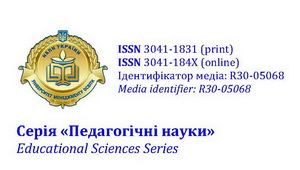Innovations in modern music pedagogy in the context of exploring ethnoculture
Анотація
Ключові слова
Повний текст:
PDF (English)Посилання
REFERENCES / СПИСОК ВИКОРИСТАНИХ ДЖЕРЕЛ
S. A. Abdullayeva, Azərbaycan folklorunda xalq çalğı alətləri. Bakı, Azərbaycan : Adiloğlu, 2007. [Online]. Available: http://www.anl.az/el/Kitab/2014/227289.pdf Application date: December 05, 2024.
Ə. Ağayev, Pedaqoji fikrimiz: dünənimiz, bu günümüz. Bakı, Azərbaycan : Elm, 2000.
R. Aslanova, Qloballaşma və mədəni müxtəliflik. Bakı, Azərbaycan : Elm, 2004. 264 s.
Ə. A. Babayeva, Azərbaycanda islam və musiqi. Bakı, Azərbaycan : Nurlan, 2001.
R. Əfəndi, Azərbaycan incəsənəti dünya muzeylərində. Bakı, Azərbaycan : 2009.
T. Əfəndiyev, Mədəniyyətdə tarixilik və müasirlik. Bakı, Azərbaycan : Təhsil, 2011.
Ə. Ə. Əlizadə, Müasir Azərbaycan məktəbinin psixoloji problemləri. Bakı, Azərbaycan : Ozan, 1998.
K. N. Həsənov, Azərbaycan qədim folklor rəqsləri. Bakı, Azərbaycan : İşıq, 1988.
Ə. Ş. Həşimov, Azərbaycan xalq pedaqogikası. Bakı, Azərbaycan, 1993.
Ə. Paşayev, Pedaqogika. Yeni kurs. Bakı, Azərbaycan : Nurlan, 2007.
F. A. Rüstəmov, Ən yeni dövrün pedaqogika tarixi. Bakı, Azərbaycan : Nasir, 2005.
S. A. Seyidova, Azərbaycan xalq professional musiqi. Bakı, Azərbaycan : Mars Print, 2005.
Р. Г. Абдуллаєва, Е. А. Саламзаде, Сучасне мистецтвознавство: витоки проблеми та методи. Баку, Азербайджан : Елм, 1997. (російською).
Ю. К. Бабанський, М. М. Поташник, Оптимізація педагогічного процесу. Київ, Україна : Радянська школа, 1982. (російською). [Електронний ресурс]. Доступно: http://e-catalog.mk.ua/NPB/EAF0C338-1E2A-489A-81D5-204C165C1BAA/ Дата звернення: Груд. 05, 2024.
Г. А. Багірова, Синкретизм мистецтв у вихованні індивіда та соціуму. Баку, Азербайджан : Елм, 2005. (російською).
Т. Ф. Кенгерлінська, Музична педагогіка – як інтеграція науки та мистецтва. Баку, Азербайджан, 2004. (російською).
І. Б. Пясковський, Логіка музичного мислення. Київ, Україна : Музична Україна, 1987. (російською).
L. Hasanova, «The main directions of the application of pedagogical innovations in modern times and the role of teachers in this activity», REDUFOR: Revista Educação & Formação, vol. 6, is. 3, e5347, 2021. [Online]. Available: https://www.redalyc.org/journal/5858/585868284010/html/ Application date: December 05, 2024.
L. Darling-Hammond, «Constructing 21st -century teacher education», Journal of Teacher Education, vol. 57, іs. 3, pр. 300–314, 2006. https://doi.org/10.1177/0022487105285962
G. Steiner-Hamsey, «How NGOs react: globalization and education reform in the Caucasus, Central Asia and Mongolia», Kumarskaya press, № 31(2), pр. 25–36, 2018.
TRANSLATED AND TRANSLITERATED / ПЕРЕКЛАД, ТРАНСЛІТЕРАЦІЯ
S. A. Abdullayeva, Folk instruments in Azerbaijani folklore. Bakı, Azerbaijan : Adiloglu, 2007. [Online]. Available: http://www.anl.az/el/Kitab/2014/227289.pdf Application date: December 05, 2024. (in Azerbaijani).
А. Aqaev, Our pedagogical idea: our yesterday, our today. Bakı, Azerbaijan : Elm, 2000. (in Azerbaijani).
R. Aslanova, Globalization and cultural diversity. Bakı, Azerbaijan : Elm, 2004. (in Azerbaijani).
А. A. Babayeva, Islam and music in Azerbaijan. Bakı, Azerbaijan : Nurlan, 2001. (in Azerbaijani).
R. Efendi, Azerbaijani art in world museums. Bakı, Azerbaijan : 2009. (in Azerbaijani).
T. Efendiyev, Historicism and modernity in culture. Bakı, Azerbaijan : Education, 2011. (in Azerbaijani).
А. А. Alizade, Psychological problems of the modern Azerbaijani school. Bakı, Azerbaijan : Ozan, 1998. (in Azerbaijani).
K. N. Hasanov, Ancient Azerbaijani folklore dances. Bakı, Azerbaijan : Isik, 1988. (in Azerbaijani).
А. Sh. Khashimov, Azerbaijani folk pedagogy. Bakı, Azerbaijan, 1993. (in Azerbaijani).
А. Pashayev, Pedagogy. New course. Bakı, Azerbaijan : Nurlan, 2007. (in Azerbaijani).
F. A. Rustamov, History of pedagogy of the newest era. Bakı, Azerbaijan : Nasir, 2005. (in Azerbaijani).
S. A. Seyidova, Azerbaijani folk professional music. Bakı, Azerbaijan : Mars Print, 2005. (in Azerbaijani).
R. H. Abdullaieva, E. A. Salamzade, Suchasne mystetstvoznavstvo: vytoky problemy ta metody. Baku, Azerbaidzhan : Elm, 1997. (rosiiskoiu). (in Russian).
Yu. K. Babanskyi, M. M. Potashnyk, Optymizatsiia pedahohichnoho protsesu. Kyiv, Ukraina : Radianska shkola, 1982. (rosiiskoiu). [Elektronnyi resurs]. Dostupno: http://e-catalog.mk.ua/NPB/EAF0C338-1E2A-489A-81D5-204C165C1BAA/ Data zvernennia: Hrud. 05, 2024. (in Russian).
H. A. Bahirova, Synkretyzm mystetstv u vykhovanni indyvida ta sotsiumu. Baku, Azerbaidzhan : Elm, 2005. (rosiiskoiu). (in Russian).
T. F. Kenherlinska, Muzychna pedahohika – yak intehratsiia nauky ta mystetstva. Baku, Azerbaidzhan, 2004. (rosiiskoiu). (in Russian).
I. B. Piaskovskyi, Lohika muzychnoho myslennia. Kyiv, Ukraina : Muzychna Ukraina, 1987. (rosiiskoiu). (in Russian).
L. Hasanova, «The main directions of the application of pedagogical innovations in modern times and the role of teachers in this activity», REDUFOR: Revista Educação & Formação, vol. 6, is. 3, e5347, 2021. [Online]. Available: https://www.redalyc.org/journal/5858/585868284010/html/ Application date: December 05, 2024. (in English).
L. Darling-Hammond, «Constructing 21st -century teacher education», Journal of Teacher Education, vol. 57, іs. 3, pр. 300–314, 2006. https://doi.org/10.1177/0022487105285962 (in English).
G. Steiner-Hamsey, «How NGOs react: globalization and education reform in the Caucasus, Central Asia and Mongolia», Kumarskaya press, № 31(2), pр. 25–36, 2018. (in English).
Посилання
- Поки немає зовнішніх посилань.
